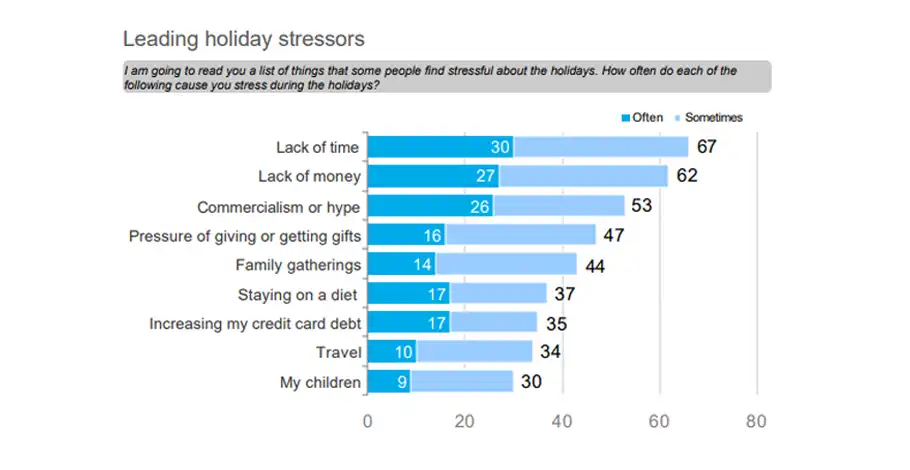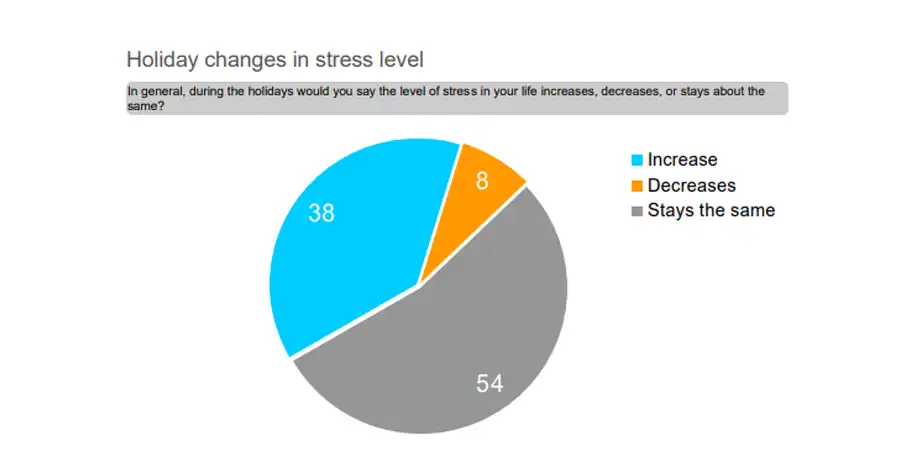Introduction
Thanksgiving, an annual celebration of abundance and gratitude, is traditionally a time for families to gather, share meals, and express appreciation for their blessings. However, according to a study conducted by the American Psychological Association, nearly 62% of Americans describe their stress level as “very” or “somewhat” elevated during the holiday season. This raises an interesting dichotomy between the ideals of thankfulness and the reality of stress associated with the holiday season.

Study Reports conducted by American Psychological Association
We analyzed and studied this data from the American Psychological Association, ensuring accuracy and comprehensive understanding of holiday-induced stress patterns in the U.S.
Some Positive Effects of Thanksgiving:
The Thanksgiving holiday, intrinsic with the notion of gratitude, has been linked with numerous mental health benefits. A study in the Journal of Happiness Studies highlights a direct correlation between gratitude and overall well-being. Gratitude practices, such as keeping a gratitude journal or verbalizing what one is thankful for, have been found to reduce depression and anxiety while enhancing empathy and self-esteem.

Study Reports conducted by American Psychological Association
Stress Overshadows the Happiness of Holidays:
However, the positive effects of gratitude are frequently overshadowed by the stressors associated with the holiday season. The pressure of hosting, financial strain, familial conflict, and the disruption of normal routines can all contribute to elevated stress levels. Furthermore, a 2014 study conducted by National Alliance on Mental Illness (NAMI) reports that many people experience heightened feelings of loneliness and isolation during this period.
Amidst this backdrop of gratitude and stress, it becomes vital to prioritise our mental health. Mindfulness-based stress reduction techniques, such as meditation and deep-breathing exercises, have been proven effective in managing stress. The Mayo Clinic suggests setting realistic expectations, planning ahead, and seeking support as effective strategies to mitigate holiday stress.
Research from the University of California, Davis, underscores the protective effect of gratitude on stress and depression. By consciously focusing on what we are thankful for, we can not only appreciate the positive aspects of our lives but also build resilience against the adverse effects of stress.
Conclusion:
The juxtaposition of gratitude and stress during Thanksgiving offers a unique perspective on mental health. As we navigate the holiday season, it’s essential to remember that while some stress is inevitable, maintaining a balanced perspective and cultivating an attitude of gratitude can significantly enhance our mental well-being.
4 Sources
We review published medical research in respected scientific journals to arrive at our conclusions about a product or health topic. This ensures the highest standard of scientific accuracy.
[1] American Psychological Association: https://www.apa.org/news/press/releases/2006/12/holiday-stress.pdf[2] American Psychological Association : https://www.apa.org/news/press/releases/2006/12/holiday-stress.pdf
[3] Journal of Happiness Studies : https://www.springer.com/journal/10902
[4] National Alliance on Mental Illness (NAMI) :https://www.nami.org/Press-Media/Press-Releases/2014/Mental-health-and-the-holiday-blues
[5] University of California: https://health.ucdavis.edu/medicalcenter/features/2015-2016/11/20151125_gratitude.html







 This article changed my life!
This article changed my life! This article was informative.
This article was informative. I have a medical question.
I have a medical question.
 This article contains incorrect information.
This article contains incorrect information. This article doesn’t have the information I’m looking for.
This article doesn’t have the information I’m looking for.